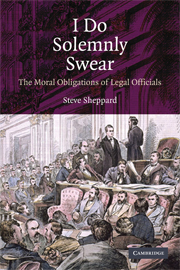Book contents
- Frontmatter
- Contents
- Preface: Moral Officials, Retail Justice, and Three Caveats
- Acknowledgments
- Introduction: Seven Questions about What Is Fit for an Official to Do
- 1 Law and Office
- 2 The Stakes: The Interests of Others in Official Actions
- 3 Officials' Obligations Arise from More Than the Law Alone
- 4 The Moral Obligations of Legal Officials
- 5 Patterns of Relationship between Legal and Moral Obligations
- 6 Breaching Obligations
- 7 Tools for the Trade: Maxims and Fallacies
- Epilogue: What the Official Ought to Do: Law and Justice
- Appendix: Taxonomy of Headings: The Lawes and Libertyes of Massachusetts (Discussed in Chapter 1)
- Index
Epilogue: What the Official Ought to Do: Law and Justice
Published online by Cambridge University Press: 05 June 2012
- Frontmatter
- Contents
- Preface: Moral Officials, Retail Justice, and Three Caveats
- Acknowledgments
- Introduction: Seven Questions about What Is Fit for an Official to Do
- 1 Law and Office
- 2 The Stakes: The Interests of Others in Official Actions
- 3 Officials' Obligations Arise from More Than the Law Alone
- 4 The Moral Obligations of Legal Officials
- 5 Patterns of Relationship between Legal and Moral Obligations
- 6 Breaching Obligations
- 7 Tools for the Trade: Maxims and Fallacies
- Epilogue: What the Official Ought to Do: Law and Justice
- Appendix: Taxonomy of Headings: The Lawes and Libertyes of Massachusetts (Discussed in Chapter 1)
- Index
Summary
Consider again the scene described in the Introduction. When Sir Edward Coke spoke to James I, he believed he knew exactly what a judge was to do. The judge was independently to exercise the powers of the law according to the restraints the law itself imposed, and according to the dictates of reason and right. Such decisions were then to be discussed and criticized by other officials, and the good decisions were to be followed and the poor ones rejected.
In the century past, we have grown accustomed to ignoring the problems of moral action, of the good and the right, so much so that to speak of official morality seems quaint or foolish. We have grown accustomed to the Phipses of our world using office for personal advantage and to the smugness of the Stoughtons, and we accept the thoughtful service of the Sewalls and, thankfully, the faithful service of the Joneses. We have learned to accept our world as governed by their laws, and we have come to believe the people have no recourse but a limited ability of political reaction.
It is therefore no surprise if the tools by which such moral assessment of official conduct can be made have grown unfamiliar. We lack a contemporary vocabulary to sort our views of the modern successors to Jones and Sewall from those of Stoughton and Phips, and we fall back on judgment of a result as right or wrong, or we fall into a partisan game of preference for our champions and resentment of their opponents.
- Type
- Chapter
- Information
- I Do Solemnly SwearThe Moral Obligations of Legal Officials, pp. 264 - 266Publisher: Cambridge University PressPrint publication year: 2009



